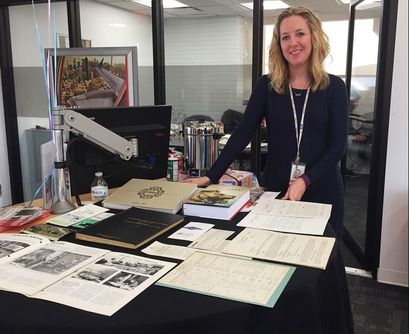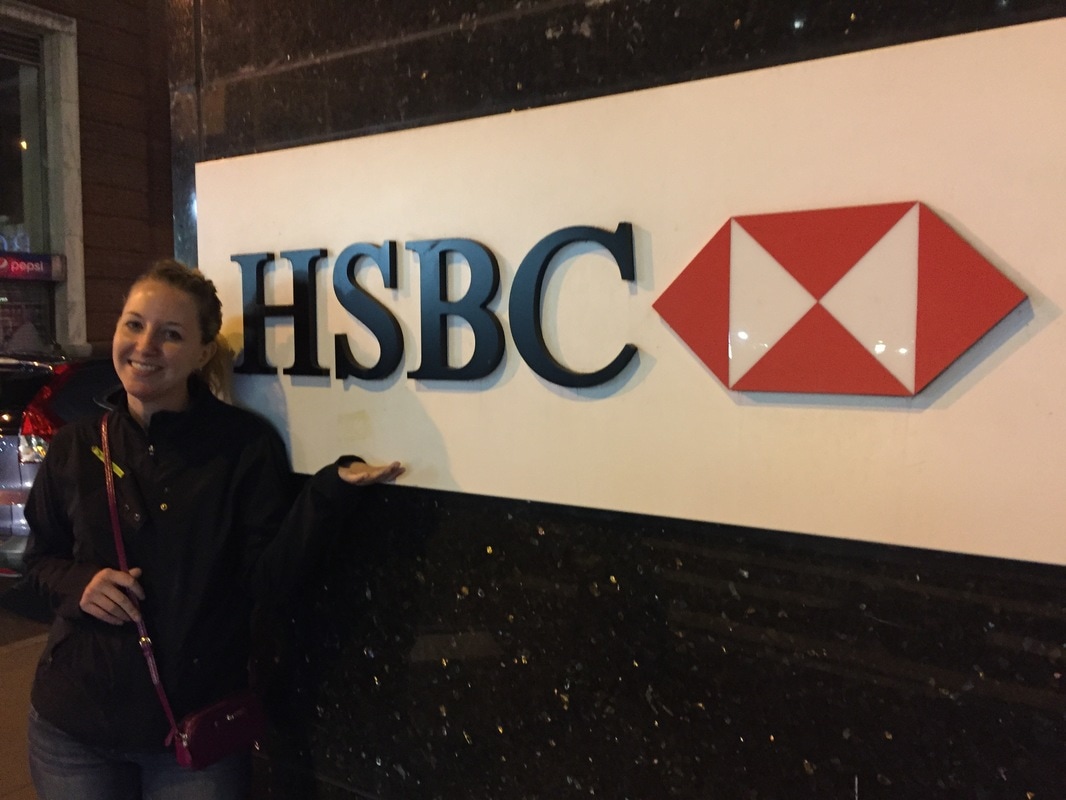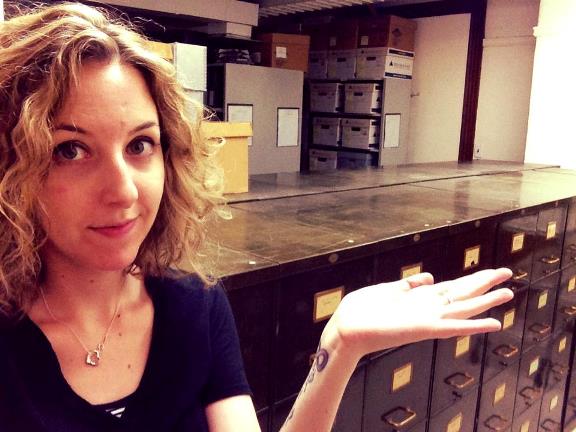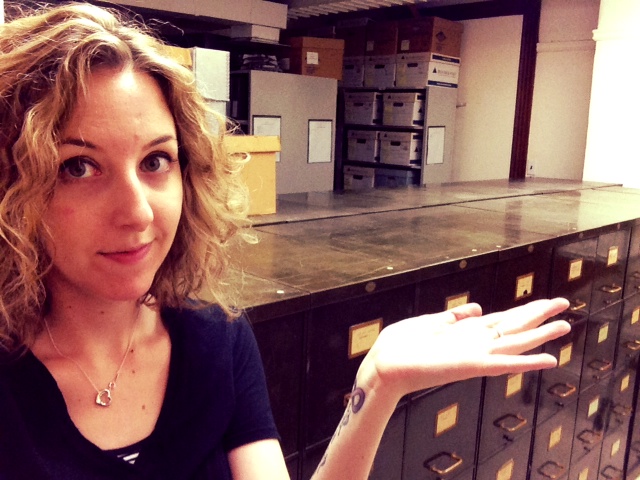 Celebrating the 90th Anniversary of a branch in Hillside, Queens! Celebrating the 90th Anniversary of a branch in Hillside, Queens! One year and four months into my "new" position (can I still say I am new?) seems like a good time for an update! I have now transitioned into being a Corporate Archivist. There are many things that are the same, but some different things too. There are truly amazing collections and materials available in corporate archives collections. Just going through the history of the organization makes me feel so proud to work for an organization like this. The global archives are very forward-thinking and take action on so many projects, not just with paper records but with digital archives and projects as well. Another great thing has been the people! There are so many different backgrounds and experience shown through my coworkers. We also truly work on a global scale. Despite being in different time zones throughout the world, we make the time for video conferencing, chatting and of course email. From the beginning I felt very connected to my coworkers, despite being so far away from so many of them. Of course, it would be great to visit these locales, but VC is the next best thing! I now have multiple years of experience in the museum/historical society world, as well as university archives land. At least in the USA, we did not focus much at all on corporate or business archives in any of my library school classes. I also cannot recall too many offerings at conferences I have been able to attend. However, last year I attended the ICA conference in Atlanta, and coming up will attend the entire day devoted to business archives at the MARAC meeting in Newark, NJ. After that, I will be presenting with my manager at a financial and banking history conference in St. Louis, MO. My coworkers and I have also been making connections at other nearby corporate archives, including the New York Stock Exchange, the Associated Press Archives, and Citibank. I'm excited to continue conversations with these and many other archivists in the New York Metro Area. So, while I cannot get into too many details, I am having a great time in my "new" role and excited to continue learning about the corporate archives world. [Opinions are all my own] Two weeks from today will be my last day at the Burke Library at Union Theological Seminary, Columbia University Libraries. I have accepted the position of United States Corporate Archivist with HSBC, based in Brooklyn, NY. My new position is permanent, full-time, and will be something I have never done before. I’m really excited to begin working there and get to know my new colleagues (both in-person and internationally!) as well as my new collections. Since putting in my notice, I’ve been trying to wrap everything up. My previous blog post did a good job discussing things for which I am most proud. I really can’t believe all I have accomplished over the last four years and four months. I supervised a total of 18 library school interns, not only from NYC schools but also from other locations in the US, as well as France and Canada. I’ve also supervised 17 other students who are matriculated at Columbia or Union Theological Seminary. Thirty-five students in four years – wow! An increased numbers of courses are also using the collections I’ve processed and made available. Today for example, a Columbia course about Global Book Histories is using ten MRL collections. A UTS class called “International Roots of the Civil Rights Movement” and a Barnard College course called “Methods in the Study of Religion” are two other courses recently in the archives. And let’s not forget about those researchers! This week alone, there are between 8-10 people using collections such as MRL2: Near East Relief Committee Records, MRL6: George Newell Papers, MRL12: American Board of Commissioners for Foreign Missions Records, WAB: World Council of Churches Records, UTS: Harry Fosdick Papers, and UTS: Henry Smith Leiper Papers. There have been so many researchers, we’ve had to do some “overflow” paging into the Conference Room! I also can’t say enough nice things about the amazing people I’ve worked with over the last 4+ years. Yesterday, my coworkers Betty and Matthew both called me down to see how many researchers were using my collections (and encouraged me to write this blog post about it!). Other directors and archivists have emailed me from across the Columbia Libraries congratulating me. It has been a wonderful place to work and so thankful for the opportunities.
Until next time… Do you ever reminisce about all of the things you’ve done and accomplished? Day by day may seem like you’re not making much of a difference, but when you look back you realize just how much you’ve accomplished?
My main priority in my position at the Burke Library is to process, arrange, describe and make available collections. My first grant from the Henry Luce Foundation focused on the Missionary Research Library Archives and the William Adams Brown Ecumenical Library Archives. Over the three-year time period, my team of students and I processed 781 linear feet of archives (178 collections). Now on my second grant which began in January 2015, we’ve processed 358.5 linear feet as of today (38 collections). In total, I’ve had a direct impact on scholarship, research and learning because I’ve made 1139.5 linear feet (216 collections) available for researchers. WOW! It is also amazing to think that if literally nothing else was processed for the rest of the year on the current project, we would still be exactly in line with what we said we would make available. Processing at a rate of 30-35 linear feet per month, we promised to make between 360-420 linear feet of archives available this year. As of 10:15am on Thursday, October 29, 2015 we have processed 358.5 LF, and I’m sure we will hit or go over that 360LF mark today. I started the social media efforts at the Burke Library in 2012. It may be hard to believe, but we didn’t have a web presence before I took on the task. Twitter, Facebook, and Foursquare were started as well as a blog. The blog and especially Twitter have made a huge impact on getting the word out about collections. One big example of this was the archivist for the World Council of Churches in Geneva, Switzerland found out about our WCC collection thanks to a Twitter post announcing the availability of the collection. Pretty cool, huh? Apart from the archives having an impact on research, teaching and learning, the internship program that I created and run has been very successful. During the first grant, I supervised 14 library school interns. Of the 14, 12 have jobs in their chosen field. They are employed by museums, archives, universities, corporate businesses, seminaries and other institutions. Of the four interns I’ve supervised thus far for the second grant, three are still in school but have obtained further (paid!) internships and positions thanks to their time working with me. ArchivesSpace is another thing I’m proud to have been a part of and experienced while at Columbia. I served on the ArchivesSpace Task Force at Columbia, and we evaluated it, tested it and really put it through its paces. I’m excited to see what happens next with ArchivesSpace at Columbia. Digital Archives too have been part of my work while here. I’ve been able to attend a number of Digital Archives Specialist courses via SAA, and I’ve presented on my findings to the Columbia community as a whole. I’ve been serving on the Archives Working Group which has helped to bring a variety of documentation, including regarding digital archives, into one space so it is much easier for staff to locate for guidance. I’ve written reports; participated in Wayfinding studies; served on committees and other advisory committees; curated two digital exhibits; written newsletters; made the Burke more efficient with usage of space; created documentation; written LibGuides; presented in classes for Columbia, Union Theological Seminary and Barnard College; presented at conferences; and on and on. I’ve grown tremendously as a professional over the last four years in New York City. And really, what more could you ask for? I recently attended the MARAC meeting in Roanoke, Virginia where I participated in a session on Friday morning called “Mentoring New Archivists: An Open Exchange.” The other professionals in my session were Lloyd Beers, Emily Cottle, and Lynn Eaton with Sarah Denison as our moderator. This was a fun session and set up a bit differently than ones I had participated in before. The first part of the session was dedicated to each of us answering some basic questions like, what’s the best advice you ever (or never) got? What do you wish you’d have known about the profession or life after graduation? What surprised, excited or disappointed you the most about being a new archivist? Can you validate or dispel assumptions and misconceptions?
After this portion, we opened it up to the room at large for questions. We had been advertising on Twitter and other social media outlets to drum up questions prior to the session, and we took “live Twitter participation” during the session as well. The final portion of the session was our break-out sessions where we spoke in smaller groups with the participants. It was a great session to be a part of and I enjoyed the audience participation immensely. So, how did I answer those questions myself? Some advice: Be ready! Ten months into my first professional job, where I was the archivist working alongside a librarian and a project archivist, the department had to reorganize and I became the sole staff member, as well as was furloughed and took a 4% pay-cut. I’ve taken on more responsibility now even in my project position. At the same time: Be Patient! My first professional job, I found the job, applied, interviewed and was hired within two weeks. My second professional job took two years of applications. Now again I have been job searching off and on due to being in an unstable project position. Don’t listen to those people who say there are tons of jobs – there aren’t, but there are other jobs like special collections librarian or similar that you could do. Just because it doesn’t have the word “Archivist” in the title, doesn’t mean you should rule it out. Networking: Friend or Foe? Networking for a job has never worked for me – all of my jobs, both as a student and as a professional, have been like a “cold call” and I didn’t know anyone there previously. Now, I will say that you should keep your network going: it keeps your morale up by realizing you’re not the only one experiencing your situation. If you have worked with me as one of my students, it keeps you on my radar. If you use me as a reference, it will keep my memory fresh about what you have been doing. I may send along jobs that I think you should apply. I’ve even had headhunters contact me looking for suggestions on who might be interested in certain jobs. Know Thyself. I believe you don’t need to specialize – I think my being more “open” in terms of my background and interests made me a better archivist when it came to processing missionary, religious and theological materials. Although I haven’t specialized in terms of getting further education in a specific area or topic, I have worked at both universities and historical societies, with a variety of collections - historical society and museum, academic, religious, etc… So, the best advice I can give is to be diverse in the types of organizations you are working in. Think about your skills – what can transfer? So many jobs now are more about the “fit” within the organization rather than if you can complete “xyz” task. Figure out how to stand out and sell yourself. To grow skills you haven’t had or you believe have grown rusty, take classes. There are also a number of online training options like iTunes U or Lynda.com that you may have access to without having to pay for it out of pocket. Lynda.com may be available via your alumni privileges at school or through your local library. Read twitter and other blogs to see about the current issues. There are even free, open-source journals that are available to you. Be honest with yourself about those skills, what you like doing, and what you are good at. Just because I am capable of being a cataloger, does not mean that is the right job for me. I hope my session was useful for those in attendance and those following along via Twitter. I look forward to more interactive sessions and further topics advising those entering in or those who are new to the field. I've written my first press release and it was published yesterday! The press release was written to publicize the successful completion of my first Henry Luce Foundation grant to process and make available the MRL and WAB collections. Check it out!
I am pleased to announce that I have (finally!) uploaded my senior undergraduate departmental honors thesis! I wrote this paper during my senior year at Millersville University while I was studying for my bachelors in history degree.
My adviser was Professor David Fortin, and I defended the thesis in front of a small committee. The committee was comprised of Professor Fortin, Dr. Tracey Weis in the history department and Dr. Derek Shanahan in the geography department. Overall this was a great experience writing the paper, and I am still proud of it eight years later. My prose and style of writing may have changed since then, but my interest in the topic has not waned. Soon after graduating from Millersville and leaving for Pittsburgh, Professor Fortin also left Millersville for a job in Philadelphia (I think)... I would love to reconnect with him and say hey. If any readers could help with that, I would greatly appreciate it! This paper has been transferred many times over many computers and operating systems. Inevitably, some of those migrations caused changes in the paper. I edited the paper to fix the footnotes; otherwise the paper is as it was in May 2007. Without further ado, here it is: Female Celtic Saints: Cross-Cultural Connections from Across the Irish Sea. Enjoy! I wrote a blog entry that I edited and submitted for publication, and it is in the just-published Fall 2013 Mid-Atlantic Archivist! Check it out =)
I usually get pretty surprised reactions when I tell colleagues, friends, and potential future students that I assign readings. Part of the reason for this is due to a gap I saw personally when I decided to dedicate myself to this field.
When I went to graduate school for my masters in library science, I had four years of hands-on, practical experience from two different organizations to draw from. I had wonderful supervisors at both locations. For some reason, though, I did not grasp the sheer amount of professional literature that existed. (This was one of the reasons why I enjoyed going to a school that had a more “theoretical” approach) The students I work with have variety of experiences, backgrounds, and could be at various times in their education. Making sure everyone reads these documents sets a baseline. Because we discuss all the readings after the student completes them, I feel it also opens up dialogue that will set the stage for the entire time the student is working with me. The following readings are organized in the order I like them to be read: Recently, I've been thinking that I need an outlet for my professional thoughts on something other than Twitter. I came to the conclusion that I needed to start a blog... so here it is.
At this point I'm not sure how often I will post. So, let's get started on this new venture... |
Archives
March 2017
Categories |



 RSS Feed
RSS Feed